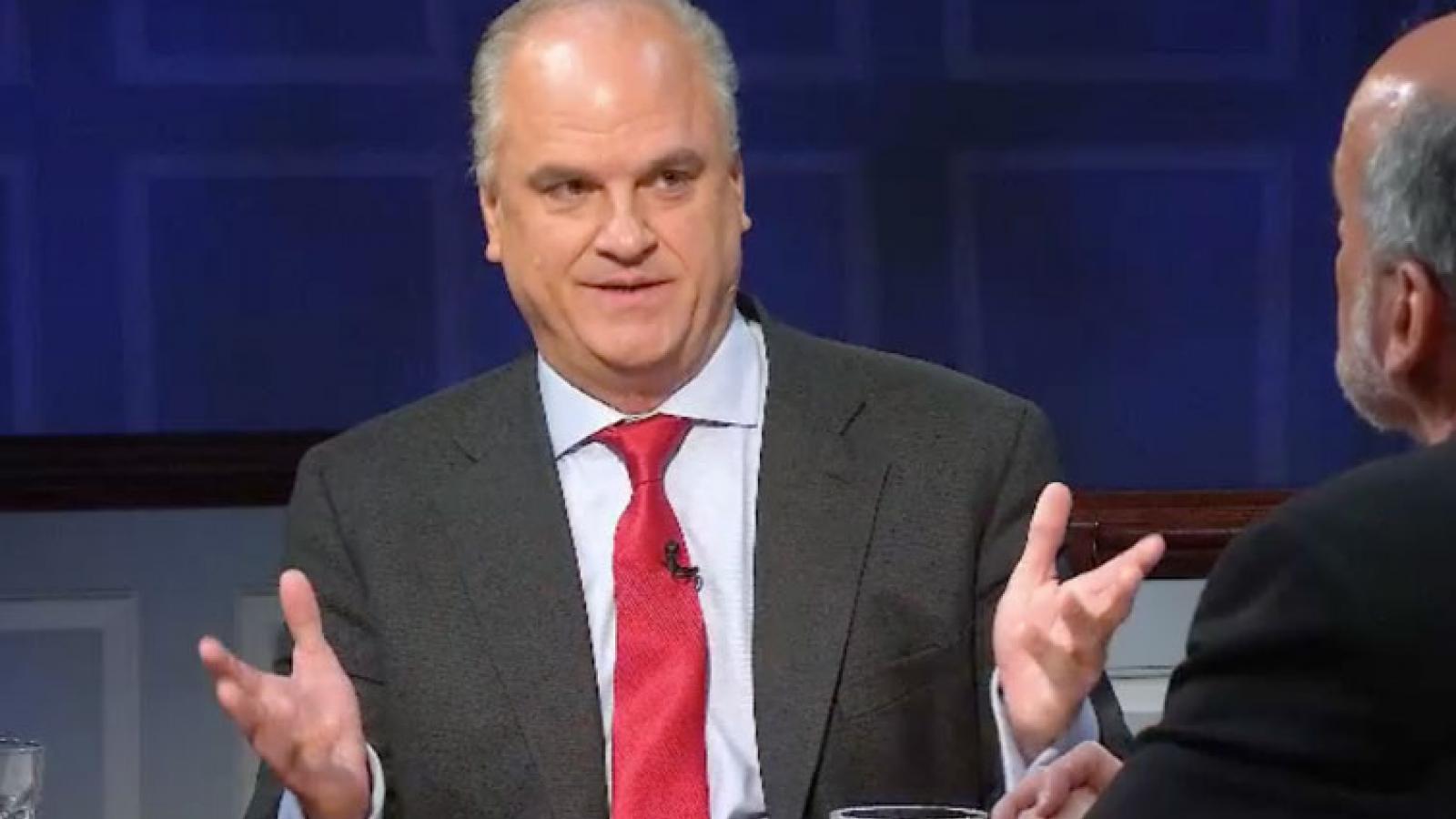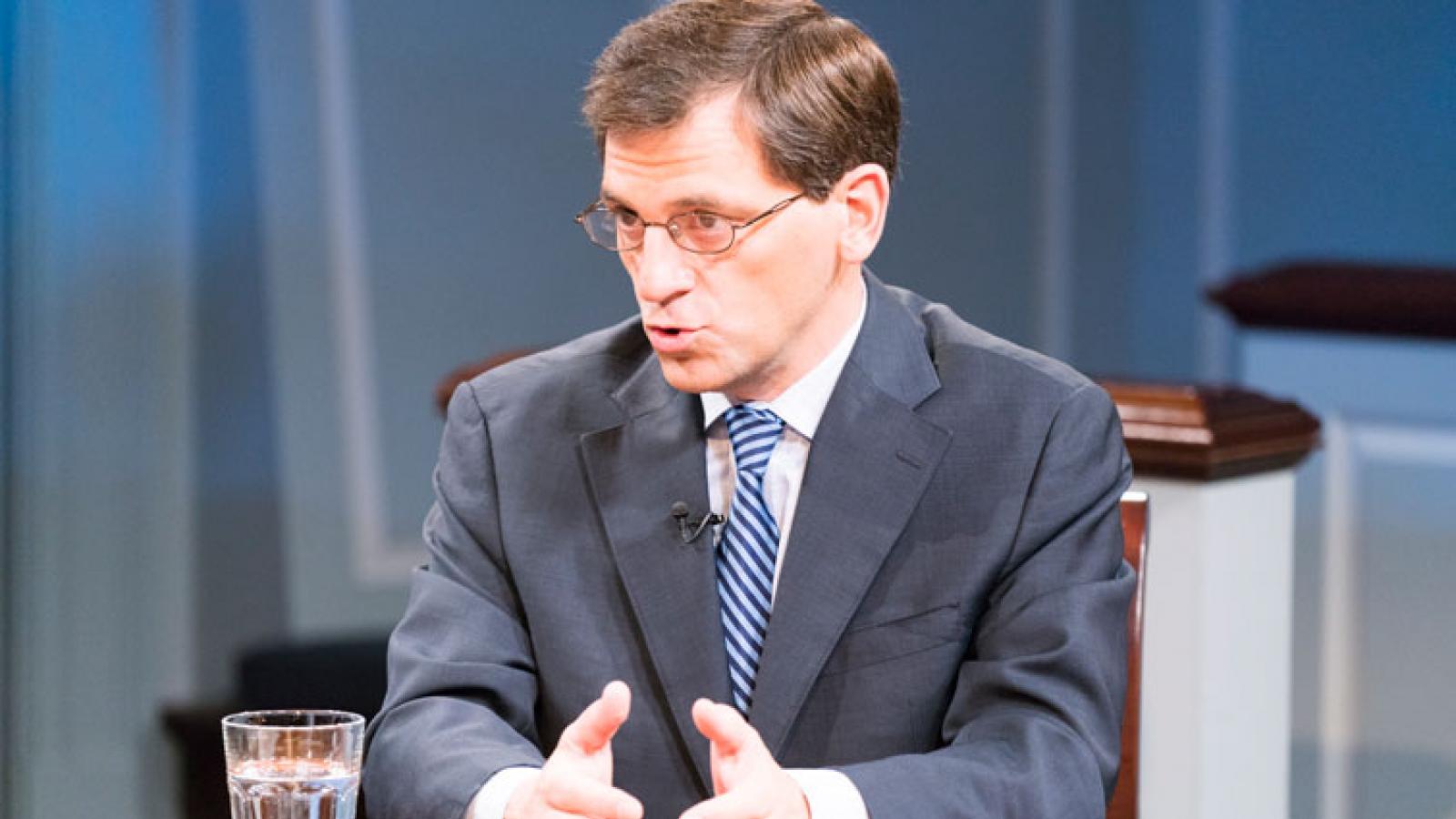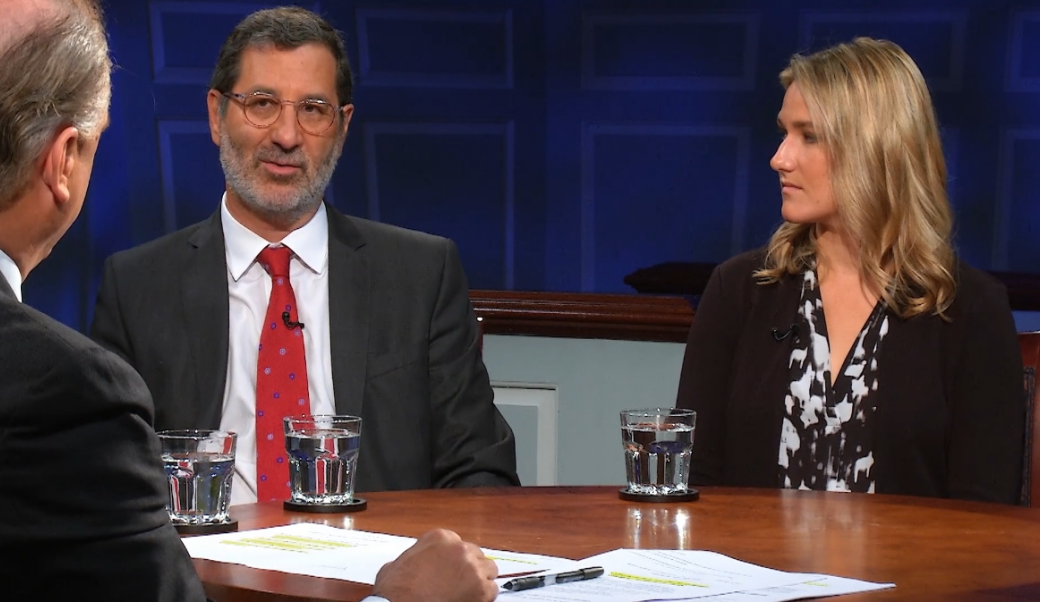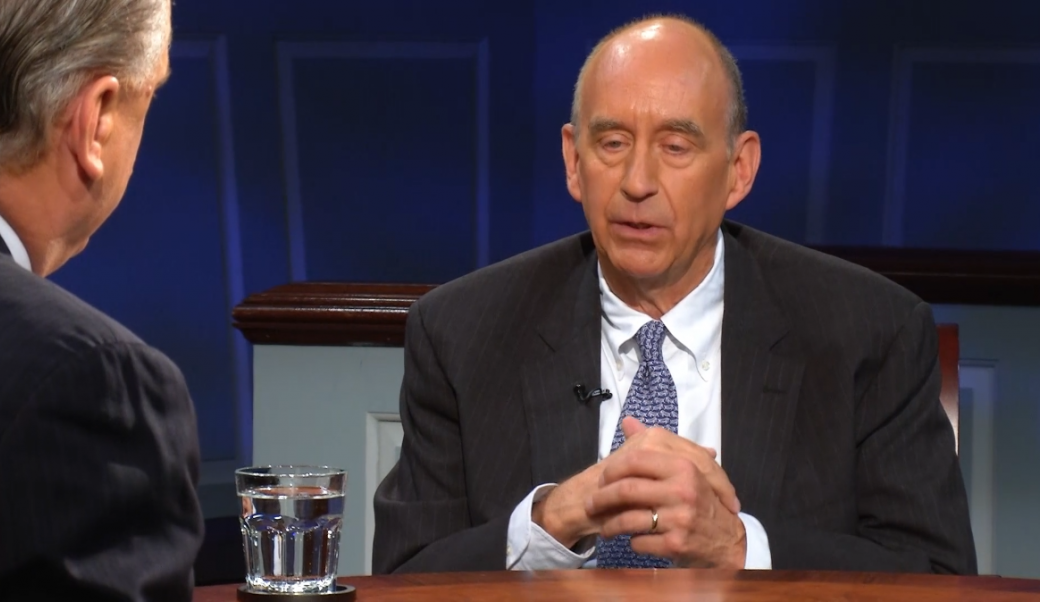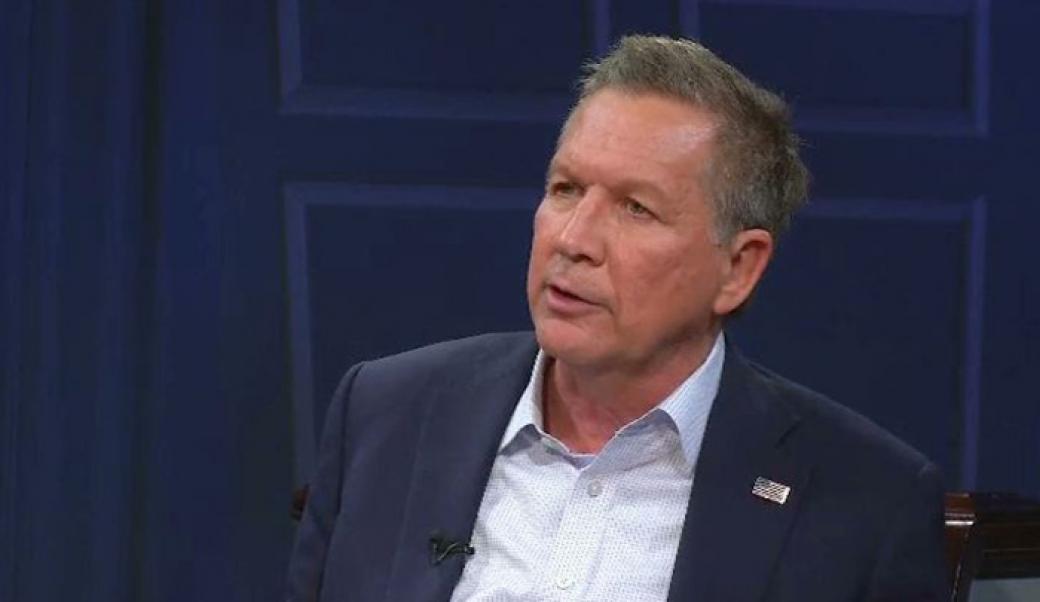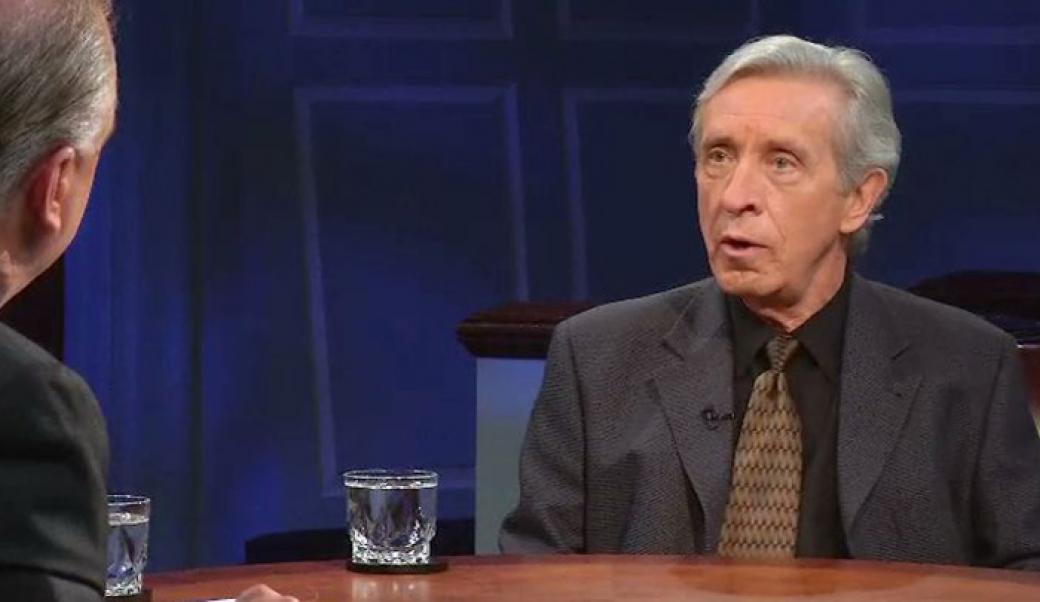About this episode
August 20, 2017
A compilation of the many perspectives and insights about President Donald Trump, from both before and after his election, as seen on American Forum
The Presidency
The wild ride: Before and after the election of Donald Trump
Transcript
DOUGLAS BLACKMON: THIS WEEK ON AMERICAN FORUM A LOOK AT THIS PAST YEAR’S WILD RIDE BEFORE AND AFTER THE ELECTION OF PRESIDENT DONALD TRUMP.
WELCOME BACK TO AMERICAN FORUM, I'M DOUG BLACKMON.
AS WE GET READY FOR A NEW SEASON OF THIS SHOW BEGINNING NEXT MONTH, WE DECIDED IT WOULD BE HELPFUL TO REFLECT BACK ON THE BIGGEST STORY OF THE YEAR: DONALD TRUMP. A YEAR AGO, HE WAS THE REPUBLICAN NOMINEE, BUT HIS POLL NUMBERS WERE IN THE DUMPS. AN AUGUST 2016 POLL HAD HILLARY CLINTON LEADING BY TEN POINTS. BUT IT WAS BECOMING CLEAR WE WERE IN UNCHARTED TERRITORY AS EVIDENCED IN THIS INTRO FROM LAST AUGUST.
BLACKMON: THE NEXT PRESIDENTIAL ELECTION IS LESS THAN THREE MONTHS AWAY, AND ONE THING IS CLEAR IN A DEEPLY DIVIDED AMERICAN. IT CAN’T GET MUCH WEIRDER THAN THIS.
BLACKMON: OH HOW WRONG I WAS. IT COULD GET A LOT WEIRDER…
JONATHAN RAUCH: DONALD TRUMP IS OUTRAGEOUSLY UNDERQUALIFIED TO BE PRESIDENT OF THE UNITED STATES. HE IS UNPREDICTABLE, NARCISSISTIC, SOCIOPATH UM..THIS IS NOT SOMEONE THAT A CONVENTIONAL PARTY WOULD EVER PUT FORWARD PARTLY BECAUSE HE’S GOING TO LOSE.
KIMBERLEY STRASSEL: He’s actually had some good ideas. His, his outreach, for instance to minorities, whether or not it is going well or not.
MARC FISHER: IF WE DO ELECT HIM IT WILL BE A PIVOT IN A WAY THAT WE’VE NEVER TURNED BEFORE.
BLACKMON: THROUGHOUT LAST FALL, AMERICAN FORUM BROUGHT YOU GUESTS FROM ALL SIDES OF THE POLITICAL SPECTRUM TO DISCUSS THIS HISTORIC ELECTION. OUR FIRST YEAR PROJECT WAS DEDICATED TO BRINGING TOGETHER SCHOLARS, JOURNALISTS, AND PUBLIC POLICY OFFICIALS FROM ALL WALKS OF LIFE TO GIVE CONSTRUCTIVE ADVICE TO THE NEW PRESIDENT. BUT WE HAD TO LEARN TOO. WE HAD TO GET EDUCATED ABOUT THIS MAN WHO BIOGRAPHERS MICHAEL KRANISH AND MARC FISHER SPENT HOURS INTERVIEWING AND SAID WOULD BE VERY DIFFERENT THAN ANY PRESIDENT WE HAD EVER KNOWN.
MARC FISHER: There was one point when I asked him how he was preparing to possibly be president. Are you reading the great presidential biographies, for example? And he paused for an unusually long time, and his voice became almost tender and he said, “you know, I’ve never read a biography but I’ve always wanted to, I’ve never had the time.”
MICHAEL KRANISH: He has said that there’s a power of narcissism, he quotes a book, by that title, The Power of Narcissism. He calls himself an army of one. He calls himself a lone ranger.
BLACKMON: AND AS WE GOT CLOSER TO ELECTION DAY, IT BECAME APPARENT TO ME THAT A SHIFT WAS HAPPENING. HERE’S PART OF MY SHOW INTRO A MONTH BEFORE THE ELECTION.
BLACKMON: Americans are experiencing what feels like a pivotal moment in the history of our political process. It’s not just that the 2016 campaign was coarse and deeply polarizing. The ground actually seems to be shifting beneath us all.
BLACKMON: AND THE SHIFT WAS TECTONIC. AFTER ALL THE DEBATES, AFTER ALL THE TRUMP GAFFS, AFTER THE CLINTON EMAIL SERVER ISSUE. AFTER THE RELEASE OF THE INFAMOUS TRUMP AUDIO RECORDING WITH BILLY BUSH, THINGS THAT WOULD HAVE BURIED ANY PAST CANDIDATE, TRUMP TROUNCED CLINTON IN THE ELECTORAL COLLEGE VOTE 304 TO 232 BUT LOST IN THE POPULAR VOTE BY ALMOST 3 MILLION VOTES.
BLACKMON: In the day before the 2016 election, you wrote in The Weekly Standard that Donald J. Trump was, quote, “A repulsive person with dangerous prejudices who’s unfit to be president.” So, when Wisconsin was called for President Trump, now President Trump, on election night, were you and what was your reaction? (laughter)
BLACKMON: AND THE MONDAY MORNING QUARTERBACKING BEGAN. BUT HERE ON AMERICAN FORUM, WE TRIED TO DIG DEEPER TO WHAT CAUSED THIS SHIFT AND WHAT IT MEANS NOW FOR THE FUTURE OF THE COUNTRY. AND WE GOT SOME GREAT ANSWERS, WITH ONE VERY CONSISTENT OBSERVATION: THAT THE ELECTION RESULTS WERE NOT SO MUCH ABOUT DONALD TRUMP AND HILLARY CLINTON, BUT ABOUT THE FEARS AND ANXIETIES OF MANY AMERICANS.
MATT KIBBE: I think we should take a step back today and understand some of the dynamics that led to people supporting Donald Trump. There’s a lot of economic anxiety, there’s a lot of distrust in the political establishment, and we have no idea how Donald Trump is going to govern.
PETER BAKER: there’s an education process for any new president, and that’s what we see in every first 100 days. It’s particularly pronounced for this one. Why is that? Because, of course, he’s the first president in American history never to have served in government or military. It’s all new to him, and even politicians who have served at lower levels it’s hard enough for, but they at least have some political instincts. They have some instincts about issues. They have some, uh, understanding of how things work. This is all new.
BLACKMON: AND AS THE COUNTRY SETTLED IN FOR THIS VERY NEW TYPE OF PRESIDENCY, IT ALSO STARTED LOOKING MORE SKEPTICALLY AT THE VARIOUS INSTITUTIONS WHOSE JOB IT IS TO INFORM AND EDUCATE THEM, NAMELY THE MEDIA. AND THAT SKEPTICISM WAS FUELLED BY THE NEW PRESIDENT HIMSELF.
BLACKMON: You’ve been in the communication business for forty years. You’re at the very top of the game. How is it that Donald Trump seems to be so much better at it than you and everybody else in the business?
JERRY SEIB: Well, look, i MEAN for starters, you have to say that Donald Trump is a master at communications. Whatever you think of him, whatever you think of the things he communicates, his ability to control the agenda is exquisite.
MARC FISHER: there’s also the dichotomy between the press bashing that he does as well as the media manipulation that he does. Uh, and they really fit hand in glove, and I think, you know, a lot of people see the bashing of the media as the enemy of the people, and they think, “Oh, he’s going after the elites and the intellectuals and the academics and the press.” Yes, but he’s also working the reporters day and night. He’s calling them on their cell phones. He’s reaching out to them unsolicited, and so that has always been the yin yang of how Donald Trump deals with the media and burnishes his own image.
BLACKMON: THE PRESIDENT’S “ENEMY OF THE PEOPLE” TWEET IN MID FEBRUARY SENT REPORTERS INTO A FRENZY. HIS WORDING WAS SPECIFICALLY, “THE FAKE NEWS MEDIA IS NOT MY ENEMY, IT IS THE ENEMY OF THE AMERICAN PEOPLE. AND HE GAVE SOME EXAMPLES INCLUDING THE NEW YORK TIMES AND CNN. AS A LONG TIME JOURNALIST FOR THE WALL STREET JOURNAL AND WASHINGTON POST, I FELT A NEED TO RESPOND MYSELF DURING ONE AMERICAN FORUM EPISODE.
BLACKMON: We will give this White House the benefit of the doubt. We will challenge its critics to prove their charges, and we also won’t shy away from discussing the president’s failures when they are obvious. That’s the same way we treated President Obama, and it’s how good journalism and good history contribute to the good governance of our nation.
BLACKMON: AMERICAN FORUM IS PRODUCED OUT OF THE UNIVERSITY OF VIRGINIA’S MILLER CENTER, THE NATION’S PREEMINENT INSTITUTION FOR THE STUDY OF THE PRESIDENCY. WE FOCUS ON HOW OUR LEADERS MAKE DECISIONS, WHY THEY FAIL OR SUCCEED AND LOOK FOR LESSONS FROM THE PAST THAT CAN MAKE THEM -- AN THE NATION -- MORE SUCCESSFUL TODAY.
BLACKMON: In the book, along these lines, there’s a passage from a tape that I wasn’t familiar with, that from December 14, 1972, you quoted as never forget—this is Nixon. “Never forget, the press is the enemy, the press is the enemy, the press is the enemy, the establishment is the enemy, the professors are the enemy. Professors are the enemy, write that on a blackboard 100 times and never forget it.”
JOHN FARRELL: And you know that was one month after her won the biggest landslide in American history.
BLACKMON: WHAT WE WERE HEARING THIS PAST YEAR SOUNDED A LOT LIKE THAT. MAINSTREAM MEDIA AGGRESSIVELY PRESSURING THE NEW PRESIDENT. CONSERVATIVE MEDIA DENOUNCING THE LIBERAL PRESS, LIKE THE NEW YORK TIMES.
RICH LOWRY: Now that doesn’t mean there are not a lot of good journalists there who do good stuff, but the general orientation of the paper is hostility towards Donald Trump. It was during the campaign, the lead story in the Times, at least I’m guessing four days a week, was something negative about Donald Trump. You never would have had any idea that this guy was very close to winning the presidency of the United States if you were just going off the front page of the New York Times, so I think media bias is a very real phenomenon.
BLACKMON: IRONICALLY, MANY HILLARY CLINTON SUPPORTERS ALSO BLAMED THE NEW YORK TIMES FOR HER LOSS. THAT THEME--THAT YOU CAN NEVER TRUST THE MEDIA, REGARDLESS OF HOW IT MAY HAVE SERVED THE NATION BEFORE--THE IDEA THAT ALL NEWS IS PROBABLY FAKE NEWS BECOME THE MANTRA OF PRESIDENT TRUMP.
E.J. DIONNE: we have a lot of questions to ask ourselves, but what we can't do is give into this notion that Steve Bannon, Trump's top advisor, is trying to spread that somehow the media are the political opposition. No they're not. They're only the political opposition if calling out untruth is now a political act, and that's up to Donald Trump. The fact that the administration has consistently said so many things already that aren't true, including Trump himself. It's not a political act to tell your readers the truth, that is called journalism.
BLACKMON: PRESIDENT TRUMP DOESN’T COMMUNICATE LIKE ANY OTHER PRESIDENT WE HAVE EVER KNOWN. HE DOESN’T LIKE GOING THROUGH THE PRESS. HE LIKES GOING DIRECTLY TO THE PEOPLE. AND FOR THAT HE USES TWITTER.
ERIC EDELMAN: I don’t think it’s a good thing for the president to be tweeting in response to every statement made by every government, and if he does he’s not gonna have any time left in his day to do anything else.
BLACKMON: he said, “The late, great William F. Buckley would be ashamed of what had happened to his prize, the dying National Review.” I don’t know if you responded to that on Twitter, but that’s a hard one, that’s a spear right into your chest.
MARK LANDLER: One of the debates that you’re going to hear a lot about that’s just beginning in newsrooms is to what extent do we treat every single tweet as the equivalent of the president standing in the East Room delivering a statement. Do we consider every single one of them as worthy of page one coverage?
GERALD SEIB: Another question. Is it necessary for those of us in the mainstream media, the hated mainstream media, to follow all those? Do we need to be sort of slavishly paying attention to every tweet? Look, when the president says something, it’s news. You can’t ignore it. I think the difficulty now is putting what he says and the way he says it in the proper con text. That’s a challenge, and that’s the challenge everybody is trying to come to terms with.
BLACKMON: AND AGAIN, WHEN FACED WITH ISSUES LIKE A PRESIDENTIAL TWEETER, WE ARE ABLE TO LOOK BACK TO EARLIER PRESIDENTS FOR HISTORIAL CONTEXT ON HOW PRESIDENTS COMMUNICATED DIRECTLY WITH Americans—NOT ONLY NIXON BUT ALSO FDR AND HIS FIRESIDE CHATS.
BRIAN BALOGH: …and I do think this is relevant to the discussion today, by being able to talk directly to the American people and regain their confidence. He used this newfangled technology. It wasn’t Twitter; it was the radio, which by the way was not brand new, right? Hoover had used the radio and Coolidge had used the radio, but Roosevelt used it in a way that personalized it, does that sound familiar? So that he could go directly to the American people, in these fireside chats, and he explained things to the American people in relatively optimistic, but simple terms, that was able to give them hope.
TIM NAFTALI: Donald Trump tweets what Richard Nixon would say to his inner circle. The uncontrolled id, the prejudice, the biases, the immature egotism, the the sense of, of the defensiveness, ah the thin skinned nature of Donald Trump’s social media persona. That was Richard Nixon in the Oval Office captured on tape.
BLACKMON: PRESIDENT TRUMP’S TWEETING OVER THE PAST YEAR HAS BEEN A SOURCE OF MATERIAL FOR POLITICIANS, JOURNALISTS, AND LATE NIGHT COMEDIANS ALIKE. AND HIS STATS ARE IMPRESSIVE. HE HAS OVER 34 MILLION FOLLOWERS ON TWITTER, RANKING 30TH AMONG ALL TWITTER USERS. AND THAT MAKES SOME UNCOMFORTABLE, ESPECIALLY THE MORE TRADITIONAL POLITICOS.
BLACKMON: one piece of advice for President Trump in the first year of his administration.
ELIOT COHEN: Stop the goddamn tweeting. laughter).
BLACKMON: THE CANDIDACY AND PRESIDENCY OF DONALD TRUMP HAS PROMPTED A DISCUSSION THAT’S BEEN BREWING FOR QUITE SOME TIME. THE IDEA THAT PEOPLE’S TRUST IN OUR GOVERNMENT INSTITUTIONS IS WANING OR HAS DISAPPEARED ALL TOGETHER.
MELODY BARNES: This is a significant problem. And the idea that we cannot trust or believe in government as an institution starts to fracture some of what allows us to come together as a country. Also, it affects the way that people see policy makers, policy-making, and believing that there is no art or science to any of it, and trust in those that they have elected to lead.
BLACKMON: More than anything else, the 2016 election showed how deeply, deeply divided we are as a country and how profoundly mistrustful Americans have become of our shared government institutions, our political processes, and our fellow citizens. We have to turn that around.
GERALD SEIB: People have gotten to a point of skepticism and perhaps cynicism about all those institutions. They don’t tend to believe what they’re told anyway. I think that’s an issue that we have to deal with as a profession, journalism, and we have to sort of cope in an environment in which people are, much more than when I started in this profession, inclined to not believe what they’re told, even when they’re being told it by institutions that they used to trust.
BLACKMON: BUT AGAIN, WE FIND WE’VE BEEN HERE BEFORE. HERE ARE SOME THOUGHTS FROM HISTORIANS.
BRIAN BALOGH: If you look at the early 1960s, Americans trusted the government. Think about John F. Kennedy asking people to ask not what their country is doing for them, what they can do for their country, this persisted even through the early Johnson years, and then within really a space of five years, every institution came under scrutiny and ultimately became distrusted by the American people. That’s what’s really underlying the shift in the late ’60s and 1970s, and that is a situation quite similar to today.
GARY GALLAGHER: Today but sort of today on steroids, I think. When I talk to students about what’s going on now and how volatile it seems in the cities and so forth, but I make the point to them, that compared to what was going on in the 1960s, what we’re seeing is relatively tame in most ways.
MARGARET O’MARA: These moments of great anti-establishment anxiety, I mean when you have a lot of change, economic change, social change, that is a time when skepticism about the ability of established institutions, whether they be government or big business, or big political parties to do the job, that’s when it crests, and we’re seeing that in 2016 as we’ve seen in earlier eras. And that is a time when parties really do need to reckon with how do they respond to these new forces, and often times the response has been to bring them in in some way.
BLACKMON: THERE IS NO QUESTION THAT THE FUTURE OF OUR POLITICAL PARTY SYSTEM IS IN DOUBT. BOTH DEMOCRATS AND REPUBLICANS ARE SPENDING A LOT OF BRAIN POWER IN THESE PAST MONTHS LOOKING AT WHAT’S AHEAD FOR THEIR PARTIES. AND THAT WAS HAPPENING EVEN BEFORE THE 2016 ELECTION.
BLACKMON: Is Donald Trump the rebirth of Conservatism that you were imagining eight, nine years ago?
SAM TANNENHAUS: Believe it or not, he could be.
KIMBERLEY STRASSEL: If Trump wins then you have a division in the party. You’ve got a president that is much more focused on those populist impulses—immigration and trade in particular—you potentially still have a Paul Ryan that is running the house who is potentially going to push back on some of those. So you may well see a movement that is, got some pretty high profile clashes and antagonism going on between them, far more maybe even so than Republicans versus Democrats.
BILL KRISTOL: I can tell myself ‘til I’m blue in the face and tell you that, oh, the party’s in really good shape except for Trump. But that’s a very big “except for” (laughter) and one of the big questions, obviously, of the next three years, maybe seven years, is how much does the Republican Party become a Trumpite party? How much is Trump just a separate phenomenon that kind of does his thing and the party kind of moves ahead in somewhat different directions? How much does the party constrain Trump? Those are really huge questions that I think it’s hard to know the answer to right now.
SAM TANENHAUS: AND the Republican Party itself has not figured out exactly what it is whether it’s libertarian and small government and pro business, whether it’s a new kind of rust belt populism. These are the terms we’re hearing applied to Donald Trump. It’s uneasy too and unsettled so I think part of what’s going on now within the political class is trying to figure out who will end up where.
RICH LOWRY: there was a debate in South Carolina, in the Republican primaries, in kind of Bush country, and Donald Trump said, “George W. Bush lied us into war,” right? That’s a democratic talking point that Republicans have rejected for ten years and he stood on the debate stage and said it loudly and proudly, and it didn’t hurt him at all and it probably helped him.
ERIC HOLDER: what do Republicans do as this administration develops, especially as we get into an election year in 2018, when their names will be on the ballot, all of the members of the House, one-third of the Senate. What do Republicans, and in particular, what do moderate Republicans do with regard to their support of the Trump administration? I think that’s something to watch in Washington, D.C.
BLACKMON: AND WHAT ABOUT THE FUTURE FOR DEMOCRATS?
THOMAS SUGRUE: It’s going to have to come from the grass roots and I think it’s going to have to come from a generation of younger Democratic Party politicians, many of whom are still figuring out their place in a post-Clinton, post-Obama, post-Trump political world And I think if the Democrats are going to resist Trump it’s not just going to be a Tea Party type movement marching on the White House but it’s going to be marching into local and state political institutions and beginning to change them one by one.
BLACKMON: SO WHERE IS ALL THIS HEADED? PRESIDENT TRUMP’S LEGISLATIVE AGENDA HAS BEEN PARALYZED BY THE DEEP DIVISIONS IN HIS OWN PARTY. BUT PREDICTIONS OF A FULL BLOWN SPLIT OF THE GOP INTO TWO DIFFERENT PARTIES HAVEN’T PANNED OUT. NOW DEMOCRATS ARE COUNTING ON REPUBLICAN DYSFUNCTION AND THE PRESIDENT’S HISTORICALLY LOW APPROVAL RATINGS TO GIVE THEM A BIG WIN IN 2018. BUT DO THEY HAVE A REAL AGENDA OF THEIR OWN—OTHER THAN OPPOSING PRESIDENT TRUMP? AND WHAT ABOUT THIRD PARTIES? THEIR PRESENCE WASN’T PARTICULARLY STRONG BY THE END OF THE 2016 ELECTION. WHAT IS THEIR FUTURE? ONE WAY TO PREDICT THAT IS TO LOOK AT OUR PAST.
MARGARET O’MARA: “Third parties are like bees, they sting, and then they die”. And third parties do sting, and why do they die? Well one reason they die, look for example at the two most successful modern third party candidacies; Teddy Roosevelt in 1912 and Ross Perot in 1992. Both of these are movements that attracted a considerable number of votes, did not win, but did enough to really arguably swing the outcome of the election at the end of the day. But, after those elections did the parties that Roosevelt and Perot headed endure? Do we even remember the names of those parties?
MATT KIBBE: And I think third parties, maybe the libertarian party, the green party, other parties, there’s talk of a constitutional conservative split off from, from the Trump Republican Party, I think all of that’s going to happen. And I think that’s the natural trend that we’re going into and particularly with millennials, like think about how they live their lives. They curate their music, their friends, their communities and everything is bottom-up, choice-based stuff except for when it comes to politics. And then they go to the political shopping mall and it feels like they’re in Caracas. There’s two things on the shelf and they both suck.
BLACKMON: TELL US HOW YOU REALLY FEEL, MATT KIBBE. IT’S ONE OF THE THINGS I LOVE ABOUT HOSTING THIS PROGRAM. OUR DEBATE IS ALWAYS CIVIL, BUT GUESTS FEEL THEY CAN REALLY OPEN UP HERE. THEY KNOW WE ARE NON PARTISAN. THEY TRUST WE ARE FAIR. IF YOU HAVE FOLLOWED AMERICAN FORUM OVER THE PAST YEAR, YOU KNOW THAT OUR FIRST YEAR PROGRAM GATHERED PEOPLE FROM ACROSS THE SPECTRUM TO ADVISE THE NEW ADMISTRATION ON HOW TO HAVE A SUCCESSFUL FIRST YEAR. THAT ALSO BRIDGED INTO THIS TELEVISION PROGRAM, WHERE YOU HEARD ME ASK A VERSION OF THIS QUESTION MANY TIMES.
BLACKMON: IF YOU WERE BACK ON THE PHONE WITH THE TRUMP PEOPLE TODAY, OR THE NEW TRUMP PEOPLE TODAY, AND THEY WERE SAYING what’s your advice now, Sai, about going forward with these kinds of things?" What would your message to President Trump or his advisors be?
BLACKMON: I WASN’T TRYING TO BE CUTE OR FUNNY. I WAS TRYING TO GET TO THE NUB OF THEIR ARGUMENT. WHAT WOULD THEY SAY IF THEY COULD GIVE ONE PIECE OF ADVICE TO THIS MOST IMPORTANT AND CONTROVERSIL MAN IN THE WORLD?
ERIC HOLDER: Try to get other voices, listen to other people before you get out there and make that first pronouncement. Don’t reflexively react to that which you see, don’t react in a political way.
GERALD SEIB: Be careful not to devalue the power of the currency you have in your pocket, which is the power of the president to communicate. Take that seriously. Don’t overuse it, and don’t create doubt about what you’re communicating.
KIMBERLEY STRASSEL: to put all of his time and effort behind one big initiative and get it done. Because this is the problem as Americans just look and they think nothing can get done in Washington, nothing that makes life better for them.
MELODY BARNES: policy making is its own art and science umm there is a discipline to it that should be respected and that there are a host of people out there that have been doing it and doing it well for quite some time. To embrace them, to learn from them.
BLACKMON: AND OF COURSE NOT EVERYONE AGREED. SOME WANTED PRESIDENT TRUMP TO BE MORE ELASTIC, OTHERS WANTED HIM TO STICK TO HIS GUNS.
TIM NAFTALI: be more deliberate and if it means changing the way you make decisions, and I know you pride yourself on a career of successes, do it. This is not the same as any experience you ever had in your professional life.
SAM TANENHAUS: Stay true to the base of voters who elected him. Listen to them.
MARGARET O’MARA: You threw out the rule book and the play book during the campaign. Throw out that playbook, and think about how you rebuild a new partisan coalition or bipartisan coalition that’s going to make government in America great again.
BLACKMON: SOUNDS LIKE SOME PRETTY GOOD ADVICE TO ME. IF THERE WAS ANYTHING REASSURING IN ALL THESE CONVERSATIONS, IT WAS HOW OFTEN WE HEARD THAT THEME—FROM BOTH CONSERVATIVES AND LIBERALS—THAT NO MATTER HOW WORRIED SOMEONE WAS ABOUT PRESIDENT TRUMP, OR ABOUT HIS OPPONENTS, MOST OF OUR GUESTS STILL HAD A BEDROCK FAITH IN THE AMERICAN SYSTEM, AND IT’S ABILITY TO WEATHER ANY STORM.
PETER BAKER: I'm a big fan of America. I’m a big fan of American institutions. And I think that the truth is there’s a lot of sort of handwringing out there right now because things do feel like they’re discombobulated and is, really, America, you know, in a screwed-up place right now. And I just have great faith that we’re going to get through this moment
MATT KIBBE: I think the American people are better than that, and I think our democracy and our republic is better than that.
GARY GALLAGHER: The republic has been through much greater crises than this, I mean much greater, and here we are, we’re still here.
SAM TANENHAUS: I also like you, Doug, was taken aback by the warnings that we were living in the last days of the Weimar Republic and the storm troopers were just about to take over the Capitol. Do we really have that little faith in our democracy and our fellow citizens?
KHIZR KHAN: WHEN WE CONTINUE TO FEEL THAT THE ONLY WAY A GRATEFUL CITZEN COULD SHOW PATRIOTISM AND CONCERN AND GRATEFULNESS TO THE COUNTRY THAT WHENEVER THERE ARE CHALLENGES, LEAVE YOUR SELF INTERESTS AT THE DOOR AND STAND UP FOR YOUR NATION AND STAND UP FOR YUR COUINTRY.
GERALD SEIB: People say, “Oh, the country is in terrible shape. It was better in the old days.” I lived through the 1970s. Things weren’t so great in the 1970s. I think America is stronger than it’s ever been. I think it’s more vibrant than it’s ever been. I think there’s more innovation going on in this country. There’s an economic transformation. But I would say, relax. This is a great country. It’s as great as it’s ever been, and it’s going to get greater, and I don’t have any doubt about that.
BLACKMON: THANKS FOR JOINING US THIS WEEK. IN THE NEXT EPISODE MORE OF THE BEST OF OUR SHOWS FROM THE PAST YEAR. IF YOU HAVE A QUESTION OR COMMENT ABOUT THIS PROGRAM OR ANY OTHER, PLEASE FEEL FREE TO CONTACT ME. MY TWITTER HANDLE IS @DOUGLASBLACKMON. SEE YOU NEXT WEEK.

